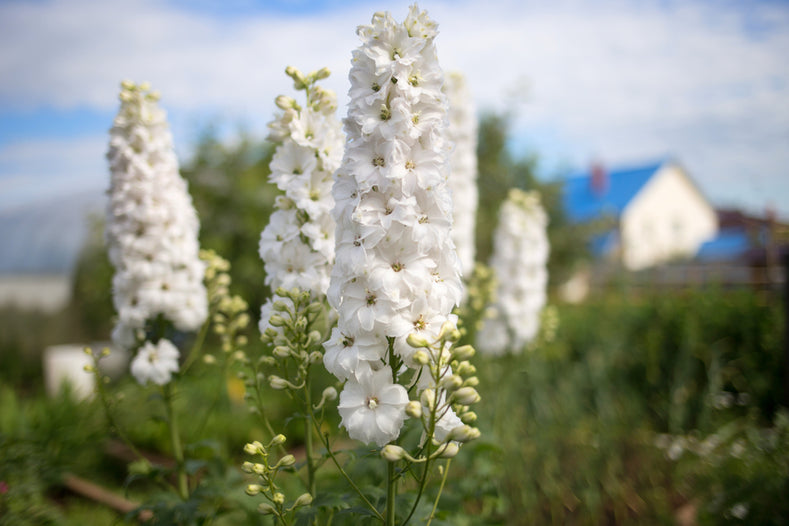Delphinium, commonly called ‘Larkspur’, is a clump forming perennial.
Delphiniums are beautiful flowering plants that belong to the family, Ranunculaceae. They are known for their tall, showy spikes of vibrant flowers, which make them popular choices in gardens and floral arrangements. It grows upright and boasts dark green foliage. It’s a great choice to incorporate in cottage gardens, beds and borders, and adds a charming flair to flower arrangements! Its height makes it ideal for the back of sunny borders where it will enjoy some protection from the elements.
Here is some more information about delphiniums:
Appearance: Delphiniums are characterised by their tall, strong stems, reaching heights of 3 to 8 feet (1 to 2.5 metres). The stems are adorned with deeply lobed, palmate leaves that give a feathery appearance. The flowers, which bloom in various shades of blue, purple, pink, white, and sometimes yellow, are arranged densely on the spikes.
Varieties: There are numerous delphinium species and cultivars available, offering a wide range of colours and sizes. Some common species include Delphinium elatum (the most popular garden delphinium), Delphinium grandiflorum, and Delphinium ajacis (often known as annual delphinium or larkspur).
Growing conditions: Delphiniums thrive in cool-temperate regions but can be grown in a variety of climates. They prefer full sun exposure for at least six hours a day, although they can tolerate partial shade. Well-drained soil with a pH range of 6.0 to 7.0 is ideal for these plants. They also benefit from staking or support due to their height and susceptibility to wind damage.
Care and maintenance: Adequate watering is essential for delphiniums, particularly during dry spells. Mulching around the base of the plants helps retain moisture and control weeds. Regular feeding with a balanced fertiliser can promote healthy growth and abundant flowering. Deadheading (removing spent flowers) can extend the blooming period, and cutting back the entire plant after flowering can encourage a second flush of blooms.
Pest and disease management: Delphiniums are susceptible to pests like aphids, slugs, and snails. Regular monitoring and early intervention with organic or chemical controls can help manage these issues. Powdery mildew and crown rot are common diseases affecting delphiniums, so proper air circulation and avoiding overhead watering can reduce the risk of infection.
Symbolism and uses: Delphiniums symbolise joy, grace, and a light-hearted nature. They are often used in floral arrangements and bouquets, adding height and vibrant colour. Their striking appearance also makes them popular in garden borders, cottage gardens, and as cut flowers for special occasions.
It's important to note that delphiniums contain alkaloids that are toxic if ingested, so it's advisable to keep them away from children and pets.
Overall, delphiniums are exquisite flowering plants cherished for their tall spikes of colourful blooms, adding elegance and charm to any garden or floral display.
How to Plant Delphinium:
Keep in mind that Delphiniums thrive in sunny spots but cool temperatures, and can dry out in hot and humid weather. A place with plenty of sun that also offers protection is an ideal planting site. When planting, you can add compost to the bottom of planting holes to help nourish the plants. In heavy soils, you can add grit to improve drainage. It’s best to feed Delphiniums regularly once they start to emerge, so add a liquid fertiliser every week or two to support their growth. Spring is an ideal time to introduce stakes for the new plants to grow along. Once they have finished flowering, remove the spent flowers to encourage new growth, and you might just get a few more new blooms in late Summer.


